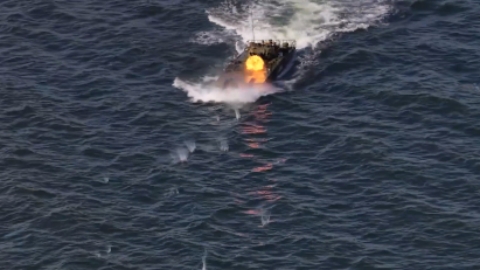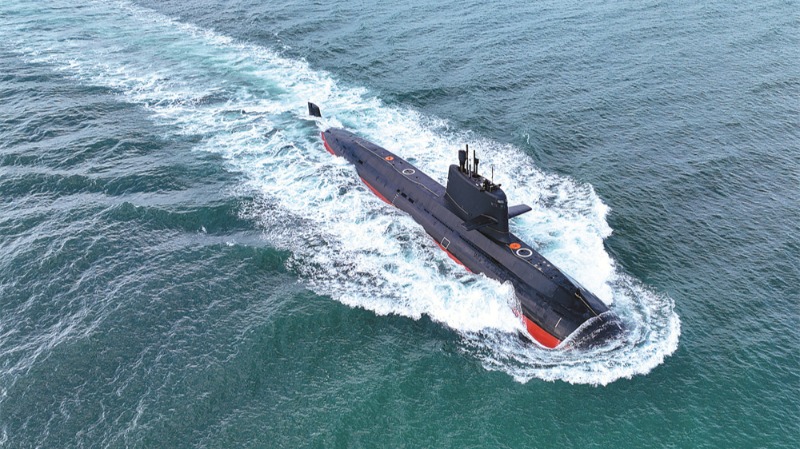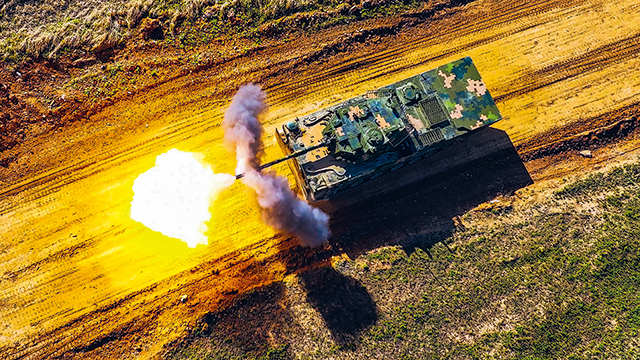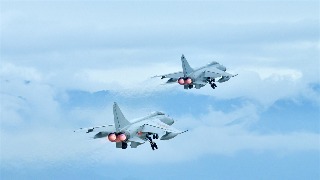By Li Jinyu, Wang Can
李金彧王粲
According to a report by Kyodo News, the Japanese Ministry of Defense has submitted a budget request for the fiscal year 2024 amounting to 7.7385 trillion yen(approximately 53 billion USD), reaching a new historical high.
据日本共同社报道,日本防卫省2024年度预算申请额达7.7385万亿日元,再创历史新高。
Looking back at the trend of Japan's defense spending in recent years, the actual expenditure on defense by the Japanese government has seen a substantial increase. After surpassing five trillion yen in 2016 and crossing the six trillion mark in 2022, the budget request has now exceeded seven trillion in just one year. At the end of last year, the Japanese Ministry of Defense officially adopted three new strategic documents: the National Security Strategy (NSS), the National Defense Strategy (NDS), and the Defense Buildup Program, clearly stating that the total defense budget for the next five years will not be less than 43 trillion yen, with the goal of achieving a defense expenditure-to-GDP ratio of 2% by 2027. The rapidly expanding defense budget reflects a shift in Japan's approach from taking small steps to making bold strides on the path of military expansion.
回顾近年来日本防卫费的走势,日本政府防卫费实际使用数额呈大幅跃升——2016年“破五”(超过5万亿日元)后,2022年“破六”,仅隔了一年申请额即“破七”。去年底,日本防卫省正式通过新版“安保三文件”,明确规定从2023年起五年内防卫费总额将不少于43万亿日元,并将于2027年实现防卫费占比达到国内生产总值的2%的目标。疯狂膨胀的防卫预算,反映出日本政府在整军扩武的道路上已从“小步快跑”转向“大步狂奔”。
As a defeated nation in World War II, Japan detected opportunities amidst the shifting global strategic landscape following the conclusion of the Cold War between the United States and the Soviet Union. It tirelessly pursued the goals of national normalization and military expansion. While vehemently refuting its history of invasion and whitewashing its acts of aggression, Japan continuously augmented its defense budget and breached the constraints of the pacifist Constitution.
日本作为二战战败国,在美苏冷战结束后的国际战略格局变动中嗅到机会,将追求“国家正常化”和“军事大国化”作为不懈推进的国家目标,一边竭力否认侵略历史、美化侵略战争,一边不断增加防卫预算、突破“和平宪法”。
In recent years, the Kishida Cabinet has fervently portrayed Japan as facing three external threats: China, Russia, and DPRK. It continually instills the fallacy among its citizens that China's rapid military growth poses a direct threat to Japan's national security. It vigorously hypes up the notion that "a Taiwan issue is tantamount to a Japanese issue", and leverages the Ukraine crisis to entirely shift the blame onto Russia for the stagnation in the conclusion of the Japan-Russia Peace Treaty. By portraying its neighboring nations as enemies, Japan seizes the opportunity to swiftly expand its military capabilities, thereby fulfilling its ambitions of becoming a global military power.
近年来,岸田内阁极力渲染日本“面临三个外部威胁:中国、俄罗斯和朝鲜”,不断向民众灌输“中国军事实力急速增长会直接威胁日本国家安全”的谬论,大肆渲染“台湾有事就是日本有事”,并借乌克兰危机将《日俄和平条约》缔结停滞的责任完全推给俄罗斯,把日本周围的邻居全都塑造成“敌人”形象,借机急速发展军力以实现成为“世界军事大国”的野心。
When formulating its defense budget, the Japanese Ministry of Defense directly benchmarks against the NATO member countries’ defense expenditures, which are required to be at least 2% of their respective GDPs. This move not only caters to the unreasonable demands of the United States for its allies to share defense responsibilities but also breaks free from the post-war constraint that limited Japan's defense spending to no more than 1% of its GDP.
日本防卫省在编制防卫预算时,直接“对表”北约成员国防务支出至少为其国内生产总值的2%的标准。此举既能迎合了美国要求盟国分担防卫责任的无理诉求,又能破除战后对日本防卫费占比不得超过国内生产总值的1%的约束。
In recent years, the Japanese government has been increasingly advocating to align with NATO, actively seeking closer ties with distant NATO countries. It has invited the French and Italian air forces for joint exercises in Japan, invested 64 billion yen in collaborative research with the UK and Italy for a new fighter jet, and worked diligently to sign more Reciprocal Access Agreements with various nations. This effort aims to shift the functions of the Japan Self-Defense Forces from exclusively defensive to a more assertive defensive posture, with aspirations of transforming Japan into an outward facing major military power.
日本政府近年来频频鼓噪向北约“看齐”,主动向相隔万里的北约诸国暗送秋波,引入法国和意大利空军到日本演习,投入640亿日元联合英国、意大利研发新型战机,想方设法与更多国家签署《互惠准入协议》,妄图使日本自卫队职能从“专守防卫”向“攻势防卫”突破,成为真正的外向型“大国军队”。
In November of last year, Japan joined NATO's Cyber Defense Center, positioning itself as a partner of NATO in the East Asian region. Japan has also displayed significant enthusiasm for the US' aspiration to establish a NATO replica in East Asiaor even in the so-called "Indo-Pacific". As a way to pledge allegiance, a substantial portion of Japan's increased defense budget flows to the US through arms procurement. The budget for the fiscal year 2024, for instance, includes the cost of equipping all eight of the Maritime Self-Defense Force's Aegis-equipped destroyers with American-made Tomahawk cruise missiles by 2027.
去年11月,日本加入北约网络防御中心,成为北约在东亚地区的“盟友”。对美国构建“东亚版北约”甚至“印太版北约”的意图,日本也极其热心。作为“投名状”,日本大幅增加的防卫预算大部分将通过购买武器的形式流向美国,2024年度预算中就包含了到2027年为海上自卫队全部8艘“宙斯盾”级驱逐舰配备美制“战斧”巡航导弹的费用。
Moreover, as reported by the Nikkei Asian on August 24th, the Japanese government is contemplating revising the Three Principles on Transfer of Defense Equipment and Technology guidelines. The proposal suggests that Japan can export defense equipment jointly developed with other countries to third parties. Even if the finished product has lethality, individual components can still be exported as long as they are non-lethal. By abolishing the restriction that limited exports to non-combat equipment, Japan aims to export equipment with lethal capabilities to a wider range of countries and to lift the ban on ammunition exports. This would enable Japan to export the next-generation fighter aircraft developed in collaboration with the UK and Italy to other countries. Additionally, engines from decommissioned JSDF fighter aircraft could also be sold. Given the ongoing and protracted conflict between Russia and Ukraine, Japan's actions in this direction could further entangle it in the war. This seems to be a demonstration of allegiance to American hegemony, where Japan's deference to the United States' leadership is evident. Subsequently, Japan's intentions for military expansion, whether openly or semi-publicly, are unmistakably revealed.
而且,据《日本经济新闻》8月24日报道,日本政府正在谋划修订“防卫装备转移三原则”的运用指针,主张日本与他国联合研发的防卫装备,可以从日本出口到第三国;即便成品具有杀伤力,但只要零部件本身不具有杀伤性就可以出口该零部件;废除“只有非战斗目的的装备才可以出口”的限制,将具备杀伤能力的装备出口到更多国家,并放开弹药出口。这样一来,日本就可以向其他国家出口与英、意联合研发的下一代战斗机,日本自卫队不再使用的二手战斗机的引擎也可卖出去了。在当前俄乌冲突旷日持久的情况下,日本这样做将更深地卷入战争之中,唯美国霸权马首是瞻以表“忠心”,然后公开或半公开扩军的心思暴露无遗。
In this wholehearted effort to serve American interests, Japan has gained tacit approval from the US regarding its controversial decision to discharge nuclear wastewater into the ocean. Driven by their strategies of "containing Russia" and "containing China", the US is presently reliant on Japan's financial and operational contributions. Consequently, numerous criticized actions by Japan, such as data manipulation and illegal whaling, are being overlooked. The US-Japan alliance appears to disregard the harm these actions inflict on the global population, including their own citizens, and the overall ecological environment of the planet. This showcases the selfishness and mutual exploitation of Japan and the US, who place their own gains above all else.
如此全身心地为美国着想,日本换来了美国在其核污水排海这一龌龊决定上的默许。因为“遏俄”“遏华”战略,美国当前急需日本出钱出力,所以在数据造假、非法捕鲸等许多被世人诟病的日本恶行上睁一只眼闭一只眼。美日同盟全然不顾这些行为对包括美日两国人民在内的全世界人民和整个地球生态环境的伤害,将自私自利、相互利用表演到了极致。
Japan has never genuinely reflected on its wartime responsibilities, nor has it shown a commitment to becoming a truly responsible nation. Deeply entwined with the hegemonic chariot of the US, Japan's defense budget has consistently grown. It frequently exacerbates regional tensions in pursuit of military advancements, going to great lengths to break free from the constraints of the pacifist Constitution. These actions by Japan are highly perilous.
日本从没有真正地反省其战争罪责,也没能举一反三立志做一个真正负责任的国家。日本与美国的“霸权战车”深度绑定,防卫预算连年增长,还动辄渲染地区紧张局势以谋求自身军力突破,使出浑身解数挣脱“和平宪法”的束缚。日本这一动向十分危险。




















